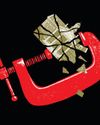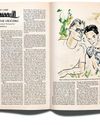Versuchen GOLD - Frei
ANNALS OF INQUIRY YOU FIRST
The New Yorker
|February 27, 2023
Does anyone really know what it means to be "Indigenous"?

Identity evolves. Social categories shrink or expand, become stiffer or more elastic, more specific or more abstract. What it means to be white or Black, Indian or American, able-bodied or not shifts as we tussle over language, as new groups take on those labels and others strip them away.
On August 3, 1989, the Indigenous identity evolved. Moringe ole Parkipuny, a Maasai activist and a former member of the Tanzanian Parliament, spoke before the U.N. Working Group on Indigenous Populations, in Geneva— the first African ever to do so. “Our cultures and way of life are viewed as outmoded, inimical to national pride, and a hindrance to progress,” he said. As a result, pastoralists like the Maasai, along with hunter-gatherers, “suffer from common problems which characterize the plight of indigenous peoples throughout the world. The most fundamental rights to maintain our specific cultural identity and the land that constitutes the foundation of our existence as a people are not respected by the state and fellow citizens who belong to the mainstream population.”
Parkipuny’s speech was the culmination of an astonishing ascent. Born in a remote village near Tanzania’s Rift Valley, he attended school after British authorities demanded that each family “contribute” a son to be educated. His grandfather urged him to flunk out, but he refused. “I already had a sense of how Maasai were being treated,” he told the anthropologist Dorothy Hodgson in 2005. “I decided I must go on.” He eventually earned an M.A. in development studies from the University of Dar es Salaam.
Diese Geschichte stammt aus der February 27, 2023-Ausgabe von The New Yorker.
Abonnieren Sie Magzter GOLD, um auf Tausende kuratierter Premium-Geschichten und über 9.000 Zeitschriften und Zeitungen zuzugreifen.
Sie sind bereits Abonnent? Anmelden
WEITERE GESCHICHTEN VON The New Yorker

The New Yorker
THE TALK OF THE TOWN
The militarization of American cities, including Los Angeles, Portland, and Chicago, has brought home a perverse irony. T
4 mins
October 20, 2025

The New Yorker
THIS IS MISS LANG
The brief life and forgotten legacy of a remarkable American poet.
19 mins
October 20, 2025

The New Yorker
RAMBLING MAN
Peter Matthiessen's quest to escape himself—at any cost.
15 mins
October 20, 2025

The New Yorker
DEGREES OF HOSTILITY
How far will the Administration's assault on colleges and universities go?
26 mins
October 20, 2025

The New Yorker
GOINGS ON
What we're watching, listening to, and doing this week.
6 mins
October 20, 2025

The New Yorker
READY OR NOT
Zohran Mamdani wants to transform New York City. Will the city let him?
37 mins
October 20, 2025

The New Yorker
Alexandra Schwartz on Joan Acocella's "The Frog and the Crocodile"
When I am stuck on a sentence or trying to wrestle an idea into shape, I turn to Joan Acocella.
3 mins
October 20, 2025

The New Yorker
A BROTHER'S CONVICTION
Did a grieving man's quest for justice go too far?
43 mins
October 20, 2025

The New Yorker
THE KEY TO ALL MYTHOLOGIES
Why the quest for a master code goes on.
13 mins
October 20, 2025

The New Yorker
FOR ART'S SAKE
\"Blue Moon\" and \"Nouvelle Vague.\"
6 mins
October 20, 2025
Translate
Change font size
